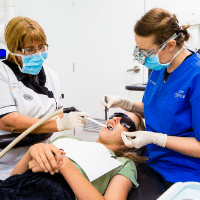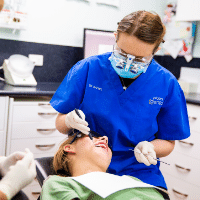Dental Hygiene Linked to Overall Health

Scientists are discovering more and more about the connections between dental health and the health of our entire body. David Goding investigates.
If our eyes are the windows to our soul, then our teeth may well be the windows to our health, according to mounting evidence that suggests there is a strong link between the two
If the scientists are right – and the evidence is becoming hard to ignore – our oral health can play a big part in our risk of heart disease, stroke, diabetes and even the health of a newborn child. And this may be only the tip of the iceberg.
“There’s a whole lot of research out there at the moment trying to focus on the links between oral health and general health in both directions – poor oral health affecting general health and poor general health affecting oral health,” says Dr Matthew Hopcraft, president of the Australian Dental Association Victorian Branch Inc.
“It’s not surprising really. The whole body is connected, but for such a long time we’ve thought about the mouth as being a separate part of the body and that dentists work in isolation from the rest of the body. That clearly doesn’t make any sense anymore, anatomically or physiologically.”
Oral Health and Heart Disease
It appears that poor oral health, and in particular the presence of inflammation in the form of gum disease, increases your risk of heart disease as well as stroke. A study conducted by the University of Queensland found that it was the bacteria found in the mouth, and more specifically in infected gums, that are so damaging. The group was able to locate T cells that are reactive to oral bacteria in the arteries of people with atherosclerosis, where damage to the arteries is caused by a build-up of fatty deposits.
“Finding oral bacteria inside coronary arteries in people with heart disease is not something you would expect to find,” says Dr Hopcraft. “But bacteria from the mouth sitting in a blood vessel in the heart suggest that this is where the link between gum disease and heart disease is coming from.
“So the mouth acts as a kind of portal, allowing bacteria to travel through the bloodstream to other parts of the body. With gum disease, the blood vessels become more swollen and more permeable, and more likely to allow bacteria or bacterial toxins from the infected gums into the bloodstream where they travel to other parts of the body.” Our gums are too often neglected, despite the fact that the health of your gums can be just as important as the health of your teeth. In fact, it can be hard to have healthy teeth without healthy gums.
Ensure you practice good oral hygiene by brushing regularly with a fluoride toothpaste, using a mouth rinse to kill bacteria and flossing daily to avoid cavities that may lead to other serious health complications. Regular check-ups and cleaning is recommended to keep your pearly whites healthy and free of cavities.
Diabetes Linked to Gum Disease
Less is known about the link between gum disease and diabetes, but the evidence is mounting. “People are now starting to do the research and understand the links much more closely,” says Dr Hopcraft. “It appears there may be a link between gum disease and diabetes, but it’s probably more the other way around. So people with diabetes are more at risk of developing gum disease or gum disease becoming more aggressive and causing more problems.”
“It’s all about the altered immune response experienced by people with diabetes that makes them more susceptible to the bacteria that cause gum disease. Poorly controlled diabetics often have problems with the microvascular system, so the small blood vessels tend not to work so well, which affects the way the gums respond and heal to gum disease.” GP Dr Ronald McCoy, from the Royal Australian College of General Practitioners, says that treating gum disease can help with diabetes. “If you can control gum disease, the diabetes becomes easier to control. Diabetes is much harder to control if there is an ongoing connection.”
From Mother to Child
The effects of dental health can even be carried from the mother to the child. “Gum disease or gingivitis is associated with increased rates of premature birth,” says Dr McCoy. “So dental health can actually impact on your child’s health, which I don’t think many people understand.”
“You should make sure very early in your pregnancy you have a dental visit to treat any issues. Around 18 per cent of premature births are related to gingivitis.” Pregnancy itself can also affect dental health.
“There is an old folk belief that you lose a tooth for every child. The idea is that pregnancy can affect your general health and certainly tooth problems can become worse during pregnancy, so it’s even more important to stay on top of it,” says Dr McCoy. “Good dental hygiene is critical for mother and child. We also look at a child’s teeth – at certain ages, certain teeth should come out – as an important measure of childhood development and growth.”
Dry Mouth Syndrome
A dry mouth can indicate a number of conditions and lifestyle factors, which can have a big impact on both oral health and overall health. “Dry mouth is a fairly common side effect for people taking a wide range of medications, particularly if you’re taking a lot of different medications; they tend to all work together to impact on saliva flow,” says Dr Hopcraft.
“Saliva is really important to be able to talk and chew and gives lubrication, which protects teeth from decay. It helps to wash away food and acid and provides a buffer against harm. People with low saliva flow are often at much higher risk of tooth decay.”
Alcohol and illegal drugs can also produce dry mouth syndrome. “A person’s mouth gives you a lot of clues straight away,” says Dr McCoy. “Alcohol and drug use can affect the teeth. Cocaine, ecstasy, heroin, amphetamines can cause a lot of damage. Then there are some medical conditions where you’ll see dry mouth, such as rheumatoid arthritis. And because the mouth is a part of the gastrointestinal system it also gives you some clue as to what’s going on in other parts of the gastrointestinal system.”
Dr Hopcraft believes that oral health can paint an even broader picture of where a person is at.
“People with oral problems often report lower overall quality of life, lower self-esteem and psychological wellbeing and because of pain or the appearance of their teeth, they don’t feel good about themselves,” he says.
Linking GPs to Dentists
With links being drawn between oral health and the rest of the body, there has been a concerted push to link GPs and dentists more than they have been in the past. “GPs need to be able to detect abnormalities,” says Dr McCoy. “They don’t necessarily need to know how to treat but to detect and then refer.” As a dentist Mackay doctors trust to refer patients, we actively encourage GPs to contact us.
The AMA agrees: “Part of what we do is to educate GPs and nurses,” says Dr Hopcraft. “The doctor should know, for instance, that their diabetic patients are more at risk of gum disease and should be telling them that part of their management should be regular dental checkups.”
“If we can improve someone’s oral health we can potentially reduce their risk of other significant health problems they may have.”
Read the full article here
The content has been made available for informational and educational purposes only. Plaza Dental does not make any representation or warranties with respect to the accuracy, applicability, fitness, or completeness of the content.
The content is not intended to be a substitute for professional personal diagnosis or treatment. Always seek the advice of your dentist or another qualified health provider with any questions you may have regarding a dental or medical condition. Never disregard professional advice or delay seeking it because of something you have read or seen on the Site.
Services we mentioned:
Related Articles
Tooth Sensitivity: Just Needs Sensitive Toothpaste, Or Symptom of Bigger Problems?
‘Sensitivity’ is the new buzzword in dentistry. Dentists are more sensitive than ever before to the needs of their...
Propolis Can Help Manage Gingivitis And Periodontal Disease
Propolis. Bee glue. The resinous tree, branch and leaf raw materials of certain plants that bees collect to make the...










